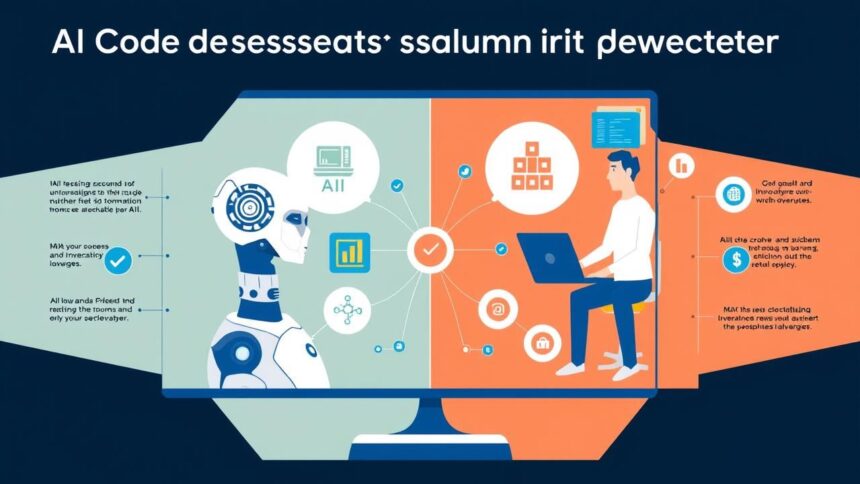Why Startups Need Developers Despite AI Coding Assistants, Says GitHub CEO Thomas Dohmke
In the rapidly evolving world of technology, artificial intelligence (AI) is making waves in almost every sector. One of the most intriguing developments is the rise of AI coding assistants. But does this mean startups can do without human developers? GitHub CEO Thomas Dohmke has some insights to share. Let’s dive into why startups still need developers, even with the advent of AI-powered coding.
1. The Rise of AI Coding Assistants
The idea of AI coding assistants has been gaining traction. These advanced tools are designed to help developers write code more efficiently by suggesting complete lines of code and even entire functions based on the context. They can spot errors, recommend optimal code structures, and learn from patterns in your code.
So, why would you still need human developers if AI can handle so much? Well, AI coding assistants, while powerful, are far from perfect. They can’t replace the kind of problem-solving and creative thinking that humans bring to the table.
1.1 Limitations of AI Technologies
- Contextual Understanding: AI systems can misunderstand the specific requirements of a project or the overall context in which the code needs to operate.
- Error Handling: While AI can spot some errors, it often struggles with novel or complex problems that human developers might recognize immediately.
- Incremental Improvements: AI learns from existing data, which means it can get better over time, but it doesn’t have the foresight to think beyond current limitations.
In essence, AI coding assistants are fantastic for speeding up repetitive tasks and ensuring consistent code quality, but they lack the holistic, intuitive, and often innovative approach that human developers offer.
2. The Human Touch in Development
Starting a startup is like building a house. You can lay down the foundation using advanced tools and machinery, but you still need skilled architects and builders to design, adapt, and make sure everything fits just right. Here’s where human developers shine.
2.1 Problem-Solving and Innovation
Developers don’t just write code; they solve complex problems. They consider edge cases, user experience, and long-term scalability. AI might suggest the next line of code, but it can’t foresee how that code will interact with other parts of the system or how it will respond to unforeseen user behaviors. Only a human developer can do that.
For example, imagine a startup building a new e-commerce platform. The AI might suggest the most efficient way to process payments. But what if the startup wants to innovate with something unique like a loyalty program that integrates seamlessly with the payments system? That kind of creative thinking requires a human touch.
2.2 Adaptability and Flexibility
Startups are in a constant state of flux. Requirements change, user feedback pours in, and sometimes, you need to pivot entirely. AI coding assistants work best in stable environments with well-defined tasks. Human developers, on the other hand, can adapt to changing conditions and pivot strategies as needed.
Consider a startup launching a mobile app. AI might help with creating the initial codebase, but it won’t be able to adjust the app’s features based on the latest market trends or user feedback. Developers, however, can iterate quickly, tweak features, and ensure the app remains competitive.
2.3 Ethical and Security Considerations
AI coding assistants don’t have ethical or moral considerations. They generate code based purely on patterns and existing data. But in areas like data privacy, security, and ethical usage, developers play a crucial role in ensuring that the code adheres to standards and regulations.
A startup in the healthcare sector, for instance, can’t rely on AI to ensure that patient data is handled securely and ethically. Human intervention is necessary to implement encryption standards, comply with regulations like HIPAA, and ensure data integrity.
3. The Collaborative Synergy
AI coding assistants and human developers can work in tandem for maximum efficiency. Rather than replacing developers, these tools can augment their capabilities, leading to a more productive and innovative development process.
3.1 Enhancing Developer Productivity
Developers can use AI coding assistants to automate repetitive tasks, allowing them to focus on more complex and strategic parts of the project. Instead of spending hours debugging, they can let AI handle the initial checks while they tackle performance optimizations or user experience enhancements.
3.2 Continuing Learning and Improvement
AI doesn’t replace learning; it supports it. Human developers can learn from the suggestions AI provides, improving their own coding skills over time. Conversely, developers can teach AI by incorporating feedback and new data into the system, making it smarter and more effective.
For instance, a developer might see a suggestion from an AI that they don’t agree with because it doesn’t fit their specific use case. They can override the suggestion and teach the AI by explaining why that specific approach is better for this context.
4. The Future of Startups and Development
As AI continues to evolve, its role in development will undoubtedly grow. However, the core need for human expertise in startups will remain. AI can handle many aspects of coding, but it can’t replace the human touch needed for innovation, adaptability, and ethical considerations.
4.1 Preparing for the Future
Startups need to invest in both AI tools and human talent. They should look for developers who are not only skilled in coding but also proficient in using AI coding assistants. This dual capability will be crucial in staying competitive in the rapidly changing tech landscape.
Moreover, continuous learning will be key. Developers must stay updated with the latest AI trends and tools, while startups should encourage a culture of innovation and adaptability.
4.2 The Role of AI in Startup Ecosystems
In addition to coding, AI can play a significant role in other areas of a startup, such as customer support, data analysis, and market research. By leveraging AI in these domains, startups can focus more on their core competencies and human interactions, ensuring a balanced and synergistic workplace.
5. The CEO’s Perspective
As per GitHub CEO Thomas Dohmke, “Developers are the backbone of innovation and progress in the tech industry.” While AI coding assistants can certainly help developers write code faster and more efficiently, they emphasize the critical importance of human developers who can understand complex problems, innovate, and adapt to changing requirements.
5.1 The Vision of GitHub
GitHub envisions a future where AI and human developers work together seamlessly. The platform is already integrating more AI-based functionalities, but the focus remains on empowering developers to be more productive and innovative. “Our goal,” Dohmke notes, “is to make developers’ lives easier, not to replace them. We believe in the power of human creativity and collaboration.”
As Thomas Dohmke puts it, “If the startup revolution of the future has AI coding assistants as the main players, it will stumble, but if it has AI coding assistants as tools in the hands of developers, it will soar.” This vision underscores the necessity of human expertise in driving startups forward.
6. Case Studies and Examples
To see these principles in action, consider a few real-world examples.
6.1 Scenario 1: A Retail Startup
Let’s take a retail startup trying to create a personalized shopping experience. AI coding assistants can help the development team quickly generate the code for the main app features, such as product listings and checkout functions. However, the personalization aspect requires intricate algorithms and an understanding of user behavior, which human developers need to design and fine-tune.
6.2 Scenario 2: A Healthcare Tech Startup
Another example is a healthcare tech startup developing an app for telemedicine. While AI can assist with the development of the app interface and basic functionalities, human developers are crucial for ensuring data security, HIPAA compliance, and seamless integration with existing healthcare systems.
6.3 Lessons from Established Startups
Established startups like Airbnb and Uber have shown the value of human developers. These companies continually innovate by leveraging developer expertise to adapt to market changes and user feedback. Airbnb’s user-facing platform or Uber’s algorithm for matching drivers and riders are products of extensive human problem-solving and innovation.
7. Conclusion
Despite the advancements in AI coding assistants, startups will always need human developers. These developers bring problem-solving skills, adaptability, and a deep understanding of the ethical and security aspects of coding. While AI can enhance productivity and efficiency, it can’t replace the creative and innovative spirit that developers bring to a startup.
As Thomas Dohmke aptly says, the future belongs to those who can leverage the strengths of both AI and human capabilities. Startups that invest in both will find that they have a competitive edge, one that’s built on innovation, adaptability, and a deep understanding of human and technological needs.
So, the next time you hear about AI coding assistants, remember that they are tools designed to help, not replace, the skilled developers who are the backbone of any successful startup. Embrace the change, but don’t overlook the essential role of human ingenuity and expertise.










